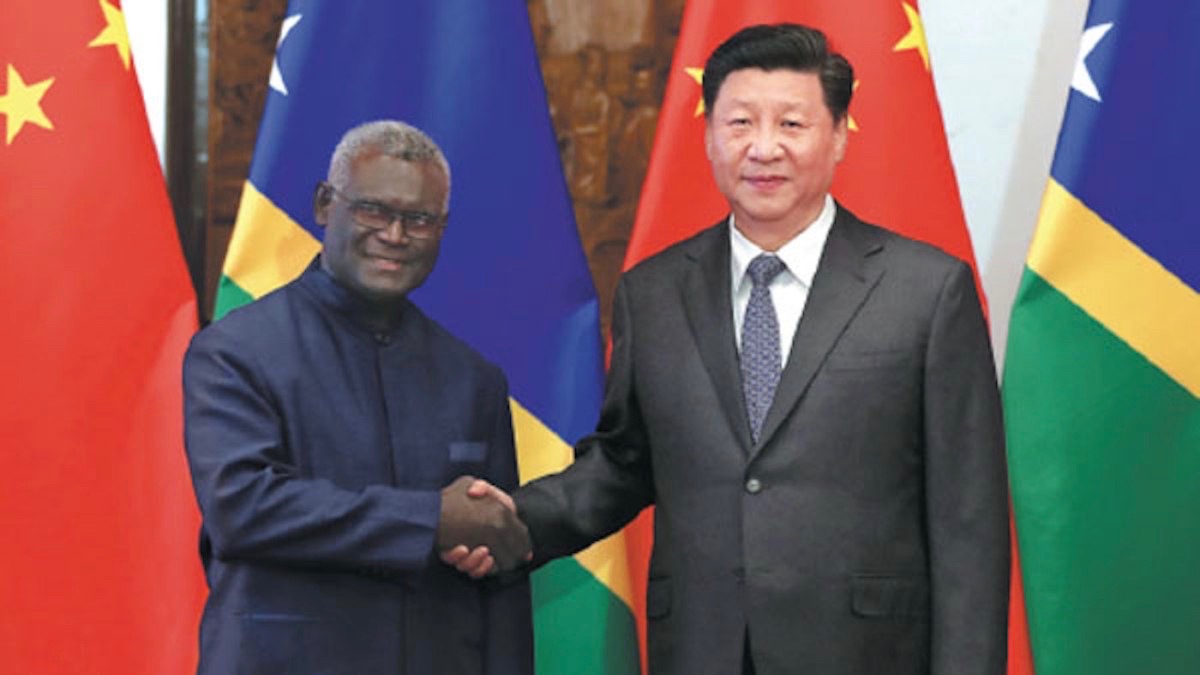The United States and its Pacific allies have sounded alarm bells over a security cooperation deal signed between Solomon Islands and China, with threats directed at China. On Sunday, April 24, the Chinese embassy in Solomon Islands hit back at the comments made by the US delegation that visited the Pacific nation last week, calling it a “blatant threat.”
The Chinese embassy’s spokesperson stated that the comments “again exposed the hegemony mindset and bullying behavior,” reported Global Times.
The spokesperson also added that “any attempt to stir up trouble, tension and opposition in Pacific island countries doesn’t conform to the common interest of regional states and won’t work.”
Last week on Friday, April 22, a high-level delegation from the US consisting of officials from the National Security Council, US Indo-Pacific Command, USAID, and assistant secretary of state for East Asian and Pacific Affairs, Daniel Kritenbrink, visited the capital Honiara and held a meeting with the Prime Minister Manasseh Sogavare over the recently signed deal with China.
The delegation explicitly told the Solomons prime minister that the US would “respond accordingly” if China maintains a long-term military presence in the country. The US and its Pacific allies like Australia and New Zealand have specifically alerted to the possibility of a Chinese military base in the region through the deal.
The remarks were released in a statement published by the White House on Friday, which also added that the US “will follow developments closely in consultation with regional partners.”
Despite repeated assurances from the Sogavare government that the deal will not pave the way for any form of long-term military presence by China or a military base, and a proposal from the Solomon Islands for a strategic dialogue with the US to discuss the matter, the US and its allies have taken an increasingly belligerent and alarmist stand against the deal.
The deal has taken highly politicized contours, especially in Australia where anti-China propaganda has reached a fever pitch as the general election nears. While the ruling conservative Liberal-National Coalition government of Prime Minister Scott Morrison was the first to attack the deal, the Australian Labor Party was prompt at using it as an election ploy, accusing the government of incompetence as the region is becoming “less secure”. More hawkish security think tanks have even called for an invasion to preempt a deal.
Many have pointed out the irony of Australian politicians raising such panic and leveling accusations of a possible Chinese military base while the country has maintained a troop presence in Solomon Islands since November 2021.
2021 unrest behind security pact
In November 2021, mass protests against the government in Solomon Islands turned into heavy rioting in the capital city Honiara and the island of Malaita. The protesters associated with Malaitan secessionists demanded the resignation of Prime Minister Sogavare and the breaking off relations with China.
The rioting that transpired targeted Chinese shops and businesses in Honiara’s Chinatown neighborhood and elsewhere, and led to at least three deaths. This was the second such attack on the island nation’s Chinese community after the mass rioting that took place in 2006 in the aftermath of a contentious general election.
Following the riots, nearly 200 foreign military personnel were called from neighboring nations Australia and Fiji to subdue the riots and maintain peace. China also sent help in the form of police equipment and gears.
By the end of the year, reports suggested that China and Solomon Islands have been in talks for a security cooperation deal in case of future violence and threats to the Chinese community and businesses.
Deepening Solomons-China relations is the threat
The animosity from the US, along with Australia and New Zealand, towards the deepening ties between Solomon Islands and China began when the former became the latest country to recognize the People’s Republic of China (PRC) as the legitimate representative of China in 2019.
Interestingly, the US, which has not maintained an active diplomatic relationship with the Solomons since 1993, only reopened its embassy in Honiara in February this year after reports of the security deal started making the rounds.
Daniel Larison, who writes on US foreign policy, recently remarked about the long-standing neglect from the US and its allies towards Solomon Islands as a reason for the nation gravitating towards China.
“The U.S. cannot neglect small nations and then expect them to fall in line when U.S. officials finally show up to complain about their relations with other states,” wrote Larison in Responsible Statecraft.
Earlier in March, hitting back at allegations of Chinese dominance, Sogavare said “We find it very insulting, Mr. Speaker, to be branded as unfit to manage our sovereign affairs.” The Solomons government on the other hand has only doubled down on its stand to deepen ties with China in the face of such pressure from its more prosperous neighbors and the US.
Sogavare, while receiving sporting facilities built by China for the 2023 Pacific Games last week, told reporters that “the relations between China and the Solomon Islands have deepened since the establishment of the diplomatic ties in 2019, and facts prove that the Solomon Islands was on the right side of history in its decision to establish diplomatic ties with China.”





